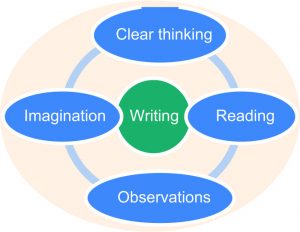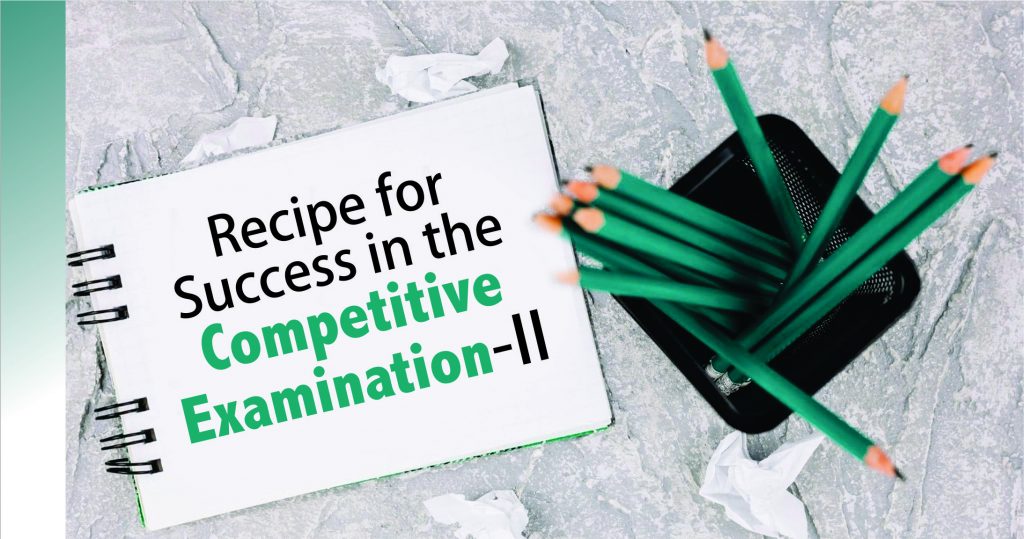Recipe for Success in the
Competitive Examination-II
Brainstorming
It is defined as group discussions to produce ideas on a given topic and solve any specific problem. It is said that more heads are better than one. However, in case of non-availability of other group members, the same thinking process can be done alone. For this, minimizing distractions is very important. Distractions include electronic gadgetry, mobile phones, videogames, television and gossip with friends. Choose a comfortable place to sit. Think to generate ideas on a given topic.
Self- study vs Group Study
A comparative analysis of self-study and group study is given below:
Group study is a good idea but it should be carried out after each member of the group has studied the relevant material on their own. Group discussion works as an interactive session which enables all the members to think critically and clarify their concepts by raising questions and answering them. Group study without individual preparation is a futile exercise.
 A. Making Notes
A. Making Notes
Aspirants should make their own notes after consulting different books and other sources.
Why is it important make notes for CSS?
It is so because you will not find all the relevant material in one source or book. You will have to consult different books. Compiling them in one place in the form of notes makes it easier to recollect and revise. On the other hand, writing notes provides you an opportunity to arrange the information and ideas in a logical sequence. Following guidelines will help you in making your notes:
Write your notes in the form of hints or clues instead of incorporating all the details.
Write as brief as possible. Brevity will enable you to make revision of syllabus in exam days when time is short and you have to revise the whole of that.
Only quotations, excerpts from reports or speeches or data should be recorded in detail as we have to reproduce those verbatim.
No important data or argument or information should be skipped.
Write only those points that you have comprehended fully.
Notes should be comprehensive, covering all the aspects asked in the previous years’ papers.
Make notes according to the topics given in the syllabus.
Ordinary concepts, which you can reproduce any time without prior preparation, should not be made part of the notes. These points can be mentioned briefly in the form of hints.
Make the following points part of your notes as these support and strengthen your arguments:
1. Concepts 2. Quotations/Famous sayings
3. Proverbs 4. Excerpts
5. Comparisons 6. Data/Facts and figures
7. Surveys/Reports 8. Examples
9. Case studies 10. Theories
Advantages of making notes
Ø Notes contain all the key points which enable you to revise swiftly.
Ø They keep you focused.
Ø They inform you about the aspect in a given topic which is not covered. For example, if you are reading the material related to any specific topic, you will not come to know which aspect you have not covered. Only writing the notes on paper will make you analyze the missing aspect.
Just pass on to next paragraph if you fail to understand the concept on your own. There is plenty of relevant material. If you consult different sources for any given topic, you may confront reading material that you will find very difficult to grasp. It is perfectly fine to pass on. The next source or reading will clarify your concepts on that given topic.
B. Making maps, diagrams, flowcharts
 Maps, graphs, flowcharts and diagrams add to the presentation of your paper and fetch you extra marks. No scale is needed to draw the maps in the paper of current affairs. Do the practice of drawing rough sketches of maps. The candidate should draw map in 3 to 4 minutes, and not more than that. Map should be relevant to the topic. It should be labelled and self-explanatory. Practice drawing the rough sketches of the following maps.
Maps, graphs, flowcharts and diagrams add to the presentation of your paper and fetch you extra marks. No scale is needed to draw the maps in the paper of current affairs. Do the practice of drawing rough sketches of maps. The candidate should draw map in 3 to 4 minutes, and not more than that. Map should be relevant to the topic. It should be labelled and self-explanatory. Practice drawing the rough sketches of the following maps.
} World, showing division of continents
} Regional blocs, i.e. SAARC, SCO, ECO
} Pakistan
} Middle East
} Indian Subcontinent showing Kashmir
} Kashmir
} Muslim World
} Other maps relating to the conflicts & issues
Flowcharts and diagrams simplify the concepts to the examiner and make his task easier. Please keep this point in mind:
“The more you facilitate the examiner, the higher score you are going to secure.”
It is to be kept in mind that no such technique should be used in the paper of Essay as it comprises only paragraphs.
C. Principles of Impressive Writing
1. Good writing skills
One should be clear in one’s mind about the topic on which one is going to write. One should develop the habit of clear thinking and expression. Good writing skills are the product of the following:
q Clear thinking q Reading
q Observation q Imagination
2. Role of practice
Impressive writing is a skill that can be learned through practice. Try to write 2-3 paragraphs daily.
3. Light and pleasant tone
One should try to write in light and pleasant tone, though it may depend on the nature of the subject. Give lightness, grace and ease to your writing. You cannot make your writing interesting for the reader if you are not yourself interested in writing it.
4. Try to write in paragraph form
Always try to write in paragraph form as in this way one states the topic sentence first and then builds arguments in support of that. This is called simple style of writing. The first sentence in the paragraph is called topic sentence which is general one. It is supported by the facts and figures in the following sentences. For example:
Corruption in Pakistan has increased over the years. Pakistan stands at 124th position among the countries of the world according to the Corruption Perception Index (CPI) 2020, published by the Transparency International. Pakistan stood at 120th position as per CPI of 2019. This poor ranking of Pakistan on the CPI suggests that elimination of this menace in Pakistan is still an elusive dream. And so on.
It is requirement of the essay to write that in paragraph form, without giving heading. In other papers, however, paragraph should follow an appropriate, specific heading. For example, if you are linking the state of political instability with reduction in foreign direct investment in the country, you should give the title “Political instability; an impediment in the way of foreign direct investment” instead of giving the title as: “Reason behind reduced foreign direct investment.”
Though there is no hard and fast rule about the strength of a paragraph, the standard strength may be set as 5-8 sentences. Following guidelines should be kept in mind while writing a paragraph:
Each paragraph revolves around one central idea which is stated in the first sentence called topic sentence.
Remaining sentences build arguments in favour of the central idea.
There should be one central idea in one paragraph.
Sentences should be in a logical sequence and order. Sequence of thoughts should be followed. The successive sentences should draw the keyword or thought from the preceding sentences. For example, capital of the Punjab is Lahore. Lahore is a historical city. (2nd sentence borrows the keyword ‘Lahore’ from the first sentence.) If you follow the logical sequence of thoughts, you will facilitate the examiner.
“The more you facilitate the examiner, the more you will get from him.”
Connectors should be used to bring coherence in a paragraph. Certain connectors are as under:
q Therefore q Hence
q For this reason q Owing to this factor
q However q First, second, the last q Consequently q Similarly
5. Avoid blunt criticism
Avoid blunt criticism. If you want to criticize, you should do it in a mild and balanced way with facts and logical arguments.
6. Your opinion should be supported by logical arguments
You should state your arguments from a personal viewpoint. It implies that your personal opinion on any subject should be duly supported by logical arguments and data.
7. Relevance
What you write should be relevant to the topic in question. No irrelevant idea should be made part of your writing. For example, if you are asked to write on the topic of women rights in Islam, it is irrelevant to give the details of feminist movements in the history of the world.
8. Meaningfulness
 Use simple and meaningful words to convey what you want to say. It is always advised that popular words should be used to convey the intended meaning. For example, if you want to refer to rise in the prices of commodities, using the word ‘inflation’ is direct and appropriate. However, use of appropriate synonyms is advised to avoid repetition of single word. Keep the following rules in mind while writing.
Use simple and meaningful words to convey what you want to say. It is always advised that popular words should be used to convey the intended meaning. For example, if you want to refer to rise in the prices of commodities, using the word ‘inflation’ is direct and appropriate. However, use of appropriate synonyms is advised to avoid repetition of single word. Keep the following rules in mind while writing.
Prefer a short word to a long one.
Prefer simple words to complex ones.
Prefer a popular word to an unfamiliar one.
Prefer a direct word to an indirect reference.
Prefer a concrete and specific word to an abstract term. If you are writing on the topic of global warming, it is better to use ‘greenhouse gases’ instead of pollutants.
Avoid slang
Don’t use hackneyed quotations and phrases.
It is said that any word that does not add to the meaning of a sentence, injures it.
9. Length of the sentence
There is again no hard and fast rule for the length of a sentence. However, short and moderate sentences should be used as they give clearness. Long sentences may be used keeping in view the nature of the subject and the significance of the idea.
 10. Getting feedback
10. Getting feedback
It is very important to get what you write checked from a reliable teacher. Otherwise, you will keep on repeating the same mistakes again and again.
D. Incorporating healthy lifestyle changes
It is important to maintain a healthy lifestyle because a healthy body has a healthy mind. Only a healthy mind can face the challenge of the uphill task of competitive examination. Someone has rightly said that if he is given 8 days’ time to cut a tree; he would spend 6 days in sharpening the axe. Optimizing the capacity of your mind is a prerequisite for success in the competitive examination. You can optimize the capacity of your mind by adopting a healthy and balanced lifestyle.
Following healthy lifestyle changes should be incorporated:
Sleep early around 10pm so that you can take sound sleep at night.
Get up early before the sunrise. There is a famous proverb which says: “Do not let the sun rise before you if you want to succeed.”
The habit of getting up early does not come alone. It comes along with other allied good habits which are stated as under:
Start your day with morning prayers. In this way, you apply for Allah’s will in your goals and aspirations. It is the best start you can make.
Do exercise or go for morning walk.
Do your breakfast around 8am as it stimulates your metabolic rate to keep you physically fit and healthy. Do not delay your breakfast. It keeps obesity away from you, in addition to many other health benefits.
Have, if possible, around one-hour sleep around 2pm to energize yourself.
Do some sports or physical activity between Asr and Maghrib prayers.
Eat healthy and natural food. Avoid oily/processed food, bakery items and carbonated drinks. No one will fill the tank of his precious Ferrari car with substandard fuel. Here the question arises why the people eat junk food? Are their bodies less valuable than their vehicles?
Keep yourself hydrated always. Drink a lot of water.
Adopt the habit of being grateful all the time. Do not be complaining person. Be grateful to Almighty for His countless blessings upon you. Gratitude creates and enhances positive energy in you. It gives you spiritual strength to rise and work hard.
Work hard but keep yourself relaxed. Keep the following quote in your mind:
“Difficult roads lead to beautiful destinations.”
Try to share what you have with others. It will come back multiplied.
Learn the art of staying happy all the time, no matter in whatever situation you are. Living a happy life is an art that can be learnt.
E. Time Management during the course of preparation
Better time management is the key to success. It comes from incorporating healthy lifestyle changes in one’s life. One such lifestyle change is to get up before the sunrise and start your day early. It leaves enough time for study.
Divide your 24 hours into small time blocks.
1st block: from 8am to 1 pm (5 hours)
First time block is a big chunk of time which comprises almost 5 hours that can be allocated to study.
2nd block: from 1pm to 2 pm (1 hour)
This is the time of Zuhr prayer and lunch break.
3rd block: from 2 pm to 3 pm (1 hour)
Make short sleep during this short interval to energize yourself.
4th block: from 3pm to Asr prayer
It is short interval to study till Asr prayer.
5th block: from Asr to Maghrib prayers
This time may be allocated to evening sports, walk or any other physical activity.
6th block: from Maghrib prayer to one hour after that
You can offer Maghrib prayer, have dinner and walk in this one hour.
7th block: Night study time
In the end, you study for a few hours up till 10 pm before you go to sleep.
In this way, you can allocate 9 to 10 hours for study along with maintaining a healthy and balanced lifestyle. Around 10-hour study is enough for a day.
This time table is just an example. You can make your own schedule keeping in view your own requirements and the number of hours available for study.
Avoiding Distractions
In order to have more time for study, one should avoid distractions which waste one’s precious time. Examples of distractions are as under:
Spending time on social media for the purposes other than study
Attending unnecessary social gatherings
F. Making Revision
After making notes, you should keep on revising on weekly or fortnightly basis. It is always good to specify one whole day weekly or fortnightly for revision of the notes. In this way, you can preserve data in your mind.
G. Time Management during Examination
In all papers, Essay paper being the exception, you are required to attempt more than one question. It is, therefore, important to calculate average time for one question and adhere to that timeline.
For example: There are 180 minutes to attempt a paper. 20 minutes may be left for review of the paper in the end. Normally, the candidate is required to attempt one compulsory question of Multiple Choice Questions (MCQs) in 30 minutes, leaving 130 minutes for remaining 4 subjective questions. It means the candidates have to complete one question in almost 32 minutes.
How to attempt a question in 32 minutes
You may take 3 to 4 minutes for brainstorming and noting down the rough outline on the last page of the answer sheet to be labelled as rough work. There is no need to start writing with haste. Be composed and think on the relevant outline. Attempt the question in remaining 28-29 minutes in the light of the rough outline. Leave space for the outline (finalized) in the beginning of the question which may be added after completing the answer. Why it is so that we allocate space in the beginning of the question and allocate time in the end? It enables us to amend the rough outline and add finished one in the last minutes.
Why is it important to add outline?
It keeps you focused. Relevance of the contents to the question is maintained. No irrelevant idea finds place in your answer.
It gives logical sequence to your answer. You become able to state your ideas in an organized way.
You get enough time to recall your memory and knowledge stored in your mind.
Enjoy the current phase of preparation for the competitive examination
In the end, a last word of caution: Do not take the preparation for CSS as a fatigue or liability. Take this as an opportunity to learn and change your life. Let what you read and learn develop your personality. Once you have decided to opt for this field, now it is time to work hard with devotion and commitment. Just enjoy reading.
Preparation for the competitive examination is not just for the purpose of examination. It develops your personality and grooms you to be a responsible and efficient officer.
Best of luck for your journey towards CSS!!!
The writer is a civil servant.
 Jahangir's World Times First Comprehensive Magazine for students/teachers of competitive exams and general readers as well.
Jahangir's World Times First Comprehensive Magazine for students/teachers of competitive exams and general readers as well.




